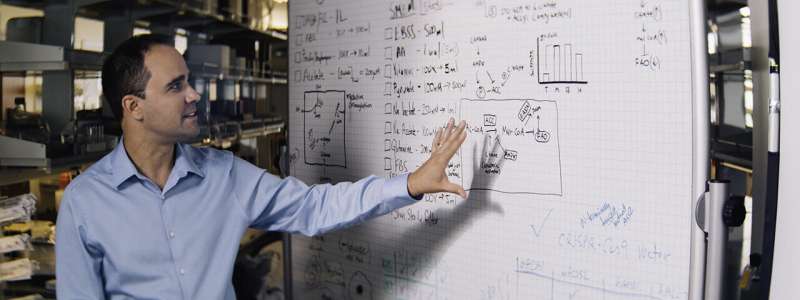This article has been reviewed according to Science X's editorial process and policies. Editors have highlighted the following attributes while ensuring the content's credibility:
fact-checked
peer-reviewed publication
trusted source
proofread
Researchers discover possible new treatment for triple-negative breast cancer

Zachary Schug, Ph.D., assistant professor in the Molecular and Cellular Oncogenesis Program of the Ellen and Ronald Caplan Cancer Center at The Wistar Institute, has published a new paper in the journal Nature Cancer. Schug's paper, titled "Acetate acts as a metabolic immunomodulator by bolstering T-cell effector function and potentiating antitumor immunity in breast cancer," demonstrates a double-acting mechanism for fighting a particularly aggressive, difficult-to-treat form of breast cancer. Schug's research shows how silencing a certain gene, ACSS2, may improve existing treatments for patients.
Triple-negative breast cancer, or TNBC, affects 10–15% of patients with breast cancer in the US. TNBC is called "triple-negative" because the cancer lacks an estrogen receptor, a progesterone receptor, and a HER2 (human epidermal growth factor) receptor. The absence of any of these receptors—receptors that when present in other forms of breast cancer, can be effectively targeted during treatment—makes treating TNBC quite difficult, and patients with TNBC have limited treatment options.
TNBC's notorious aggression makes the technical challenge of finding a reliably effective treatment target all the more serious: compared to other breast cancers, TNBC grows faster and resists treatment more stubbornly. All these factors contribute to the fact that TNBC patients suffer from worse prognoses.
But Schug and co-authors have demonstrated the efficacy of a double-acting concept: Silencing the gene ACSS2 impairs TNBC metabolism while simultaneously boosting the immune system's ability to fight it. ACSS2 regulates acetate, a nutrient that cancer cells—and TNBC cells in particular—take advantage of to grow and spread. Schug and his team used two methods to de-activate ACSS2: CRISPR-Cas9 gene editing, and the compound VY-3-135, a potent ACSS2 inhibitor identified by Schug and his colleagues in 2021.
The researchers found that targeting ACSS2 in this preclinical study not only hampered this aggressive cancer's ability to metabolize acetate and grow, it also triggered the immune system to recognize and attack the cancer. Because cancer cells with inhibited ACSS2 can't process acetate very well, the tumor region becomes bathed in acetate, which alerts the immune system of something amiss.
This process of guiding the immune system to the cancer—called "immunosensitization"—has confounded other TNBC researchers. But Schug's approach showed that ACSS2 inhibition immunosensitized against TNBC so well that tumor growth was drastically reduced, even to the point of wiping out the cancer completely in some experiments.
"Basically, we've proved that the immune system can take advantage of acetate that the tumor can't process. It kicks the cancer while it's down," said Schug. "In fact, the immune system does this so well that it remembers how to attack TNBC in the future—even if that tumor's ACSS2 gene is still active."
Another group's different ACSS2-inhibiting approach is in human clinical trials, and Schug's research shows how ACSS2-inhibiting treatment might be able to improve outcomes for patients diagnosed with the infamous TNBC. By testing ACSS2 inhibitors alongside standard anti-breast-cancer chemotherapy, Schug et al. found that ACSS2 inhibition enhanced the treatment's effectiveness.
"We knew that ACSS2 was a promising target for TNBC. Our research shows us how the immune effects of ACSS2 inhibition could eventually be used in for TNBC patients with limited treatment options," said Schug. "More research is needed, but by combining this approach with other cancer therapies, we expect to see big improvements in treating TNBC."
More information: Katelyn D. Miller et al, Acetate acts as a metabolic immunomodulator by bolstering T-cell effector function and potentiating antitumor immunity in breast cancer, Nature Cancer (2023). DOI: 10.1038/s43018-023-00636-6


















